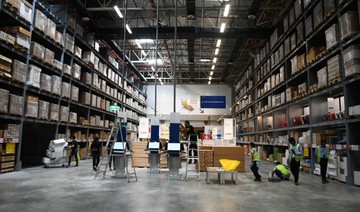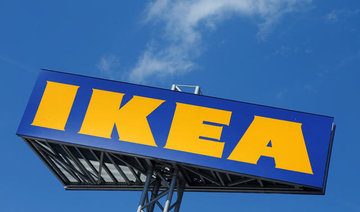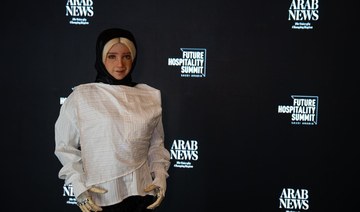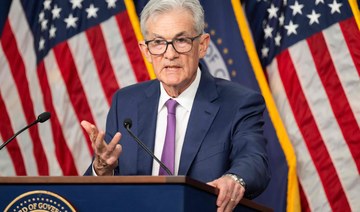HYDERABAD: Curious customers lay on beds and nestled into armchairs Thursday as Ikea opened its first Indian outlet, hoping to wow a burgeoning middle class with offerings tweaked to local tastes, including its famous meatballs.
Opened with a military band, the store in the southern city of Hyderabad is the first of 25 outlets the Swedish furniture giant hopes to open by 2025 across the country of 1.25 billion people.
Analysts said, however, that the firm’s concept of affordable, self-assembly furniture may have trouble translating to a market where do-it-yourself homemaking is an alien idea and spending levels are low.
Around 200 people queued up in the underground car park before the opening, and were greeted inside by hundreds of blue-and-yellow clad employees on the stairs waving Swedish and Indian flags.
“I’ve come all the way from Bangalore (575 kilometers, 360 miles away). I am excited to see what’s there,” garment factory employee Krishna Mohan Dixit, 39, who began lining up 90 minutes before the opening, told AFP.
“We are looking forward to it. Actually it’s my wife who got me here. Her sister sends a lot of Ikea stuff from Dubai. So here we are,” said IT manager Nasrullah Khan, 34, another early bird.
Patrik Antoni, deputy retail manager for Ikea India, told AFP that he had tears in his eyes when the first customers arrived. “It is overwhelming, a dream come true,” he said.
The changes compared with Ikea elsewhere start with the restaurant — “Smaklig Maltid — Enjoy your Meal in Swedish” is written on the wall — with space for 1,000 people, the firm’s biggest.
For religious reasons, the meatballs are not beef or pork but chicken or vegetarian instead, while Indians’ beloved biryani dish was on offer for 99 rupees ($1.44).
On Thursday, the eatery was crowded, with people happy to queue up with their trays.
Bhaskar Reddy, 35, who runs a stockbroking company in Hyderabad and who lived in Sweden for about two years, opted to compare the food first.
“I quite like the meatballs. It’s chicken and not beef but nice they have tweaked the food for our sensibilities,” Bhaskar told AFP.
Alongside standard Ikea furniture like Billy bookshelves and Klippan “loveseats,” the chain has “locally relevant products” like masala boxes, Indian frying pans called tawas, rice cake makers and mattresses with a coconut-fiber center.
There are also more than 1,000 products under 200 rupees to satisfy consumers whom John Achillea, store manager, said have “big aspirations for their homes and small wallets.” A six-piece bowl set with cutlery for kids costs 131 rupees, for example.
The interior has a noticeable local feel too, with Indian-design bedspreads and framed photos of the Taj Mahal and other Indian monuments — alongside Klimt’s painting “The Kiss” recalling faraway Europe.
“We decided not to copy and paste,” Juvencio Maeztu, Ikea’s finance chief, told AFP. “We met and interacted with 1,000 Indian families to understand what were their dreams, their frustrations and what they want.”
On Thursday, by midday the outlet was filled with people with more pouring in all the time, mostly just checking things out but with a few making their first purchases.
It was the living room section that attracted most attention with curious customers testing the softness of the sofas and stretching out on the king-sized beds.
To overcome Indians’ aversion to assembling their furniture, with people used to small, family-owned firms providing a bespoke service, Ikea teamed up with UrbanClap, an online platform connecting handymen with consumers.
After Hyderabad, Ikea plans to open outlets in the financial capital Mumbai next year, followed by Bangalore and New Delhi as it seeks to grab a share of India’s estimated $40-billion home goods market.
But Satish Meena from Forrester Research said the firm will also have to adapt its offerings to the “extremely diverse” Indian market.
“No two states or cities have the same furniture demand and behavior, lifestyle and culture vary from one region to another. Hence, Ikea will have to address space, pricing and design issues and pick products accordingly,” Meena said.
Locals in Hyderabad not at Ikea were skeptical.
“I will wait and watch,” Mohammad Noor, a businessman, told AFP. “I have never been to an Ikea store before. But I believe there it’s all compressed wood. Indian wood is much better.”
And Siddharth, who is in charge of a Hyderabad furniture shop and goes by one name, said Ikea might attract hard-up students but in general people would stick with “quality.”
“It will be a flop, I tell you,” he told AFP. “The regular furniture consumer will stick with the more solid wood available in the Indian market ... I don’t think it will give us much competition.”
Bookcases and biryani collide as Ikea tackles India
Bookcases and biryani collide as Ikea tackles India

- First of 25 IKEA stores planned for India
- More than 1000 products priced under 200 rupees
Alvarez & Marsal opens regional headquarters in Riyadh
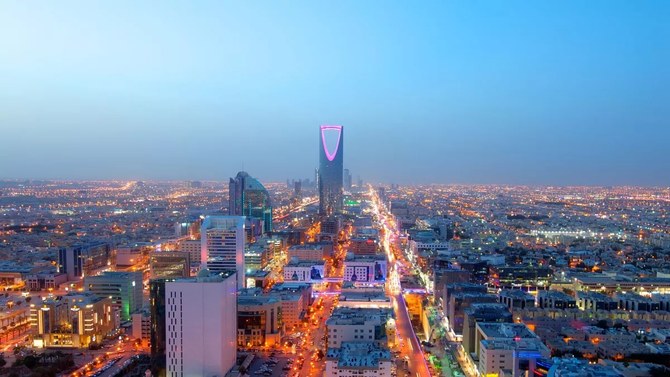
RIYADH: Underscoring international confidence in the Saudi economy, global consulting firm Alvarez & Marsal has become yet another company to have opened its regional headquarters in Riyadh.
In a press statement, the US firm stated that the inauguration of the new regional headquarters underscores its commitment to contributing to the country’s transformation agenda.
“As the company continues to deepen its roots in the country, with expertise across various sectors — from banking and tax to healthcare and disputes and investigations — this strategic move aims to leverage local insights in the Kingdom to drive sustainable growth and innovation.” the company said.
Additionally, A&M announced that it has included 13 skilled Saudi graduates in the inaugural batch of its Bidayah Graduate Program.
The company stated that these candidates were selected from a competitive pool of applicants, describing the chosen individuals as representing the bright future of the Kingdom and reflecting the potential that A&M sees in local talent.
James Dervin, managing director of A&M in the Middle East and co-head in the region, stated that the program is designed to develop the next generation of execution-focused leaders in management consulting. It is guided by the A&M principles of leadership, action, and results.
“Over the course of 12 months, participants will undergo rigorous training, engage in live project work, and receive mentorship from seasoned industry experts,” he said.
Dervin added: “Coupled with the incorporation of our regional headquarters in Saudi Arabia, the program underscores A&M’s commitment to investing in the professional development of Saudi nationals and aligning with the Kingdom’s ambitious Vision 2030,”
He further noted that the new graduates will have a significant, positive impact on his firm and the clients it serves.
Commenting on the close alignment of A&M’s global brand with the local market dynamic in Saudi Arabia, Bryan Marsal, A&M’s CEO and co-founder, said: “The all-encompassing nature of the Saudi Arabian transformation is driving significant demand for A&M’s distinctive ‘get-stuff-done’ brand of services — for our ability to fix problems, our ‘skin in the game’, and our freedom from audit conflicts.”
With over 9,000-strong workforce across six continents, A&M generates tangible results for corporations, boards, private equity firms, law firms, and government agencies grappling with intricate challenges, according to its website.
More than 180 major global companies and organizations have already established regional headquarters in the Saudi capital. These include Apple, Microsoft and Alibaba, as well as the IMF, IBM, and Google.
Other notable entities on the list include German consultancy firm TUV Rheinland, PwC Middle East, Aramex and Amazon.
UAE banks’ aggregate capital, reserves exceed $136bn
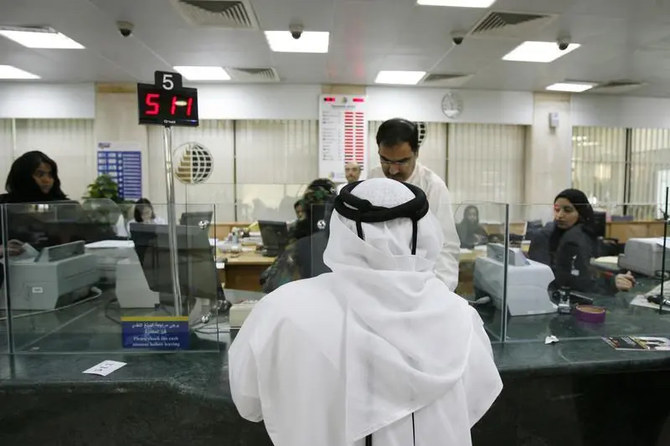
RIYADH: UAE-based banks’ aggregate capital and reserves reached 501.5 billion dirhams ($136 billion) at the end of February, up 14.4 percent year-on-year, according to new data.
The latest statistics from the Central Bank of the UAE showed that on a monthly basis, the total capital and reserves grew 0.95 percent, reflecting an increase of approximately 4.7 billion dirhams, according to the Emirates News Agency, also known as WAM.
This rise in figures falls in line with the central bank’s goal of enhancing monetary and financial stability in the country.
Moreover, the data indicated that national banks accounted for around 86.5 percent of the aggregate capital and reserves of banks operating in the UAE. At the end of February, they recorded a total of 433.7 billion dirhams, an annual rise of 14.6 percent.
On the other hand, the share of foreign banks settled at 13.5 percent, hitting 67.8 billion dirhams at the end of the same month, reflecting a 13.2 percent surge compared to the same period a year earlier.
Furthermore, at the end of February, the total capital and reserves of banks operating in Dubai alone stood at 246.4 billion dirhams, logging a year-on-year growth of 15.1 percent.
Additionally, banks operating in Abu Dhabi recorded around 217 billion dirhams, up 13 percent from the corresponding period in 2023.
Meanwhile, the cumulative capital and reserves of banks operating in other emirates combined reached an estimated 38.1 billion, reflecting a 15.5 percent climb in comparison to the same period a year prior.
In March, a top executive at Roland Berger said that UAE bank branches were witnessing the highest revenues in the region, amounting to $18.6 million per branch.
This was driven by the nation’s digital transformation, which enabled financial institutions in the Gulf Cooperation Council to reduce the number of banking branches by 328 within three years, Saumitra Sehgal, the global consulting firm’s head of financial services in the Middle East, told WAM, at the time.
Sehgal also pointed out at the time that the number of bank branches across GCC nations decreased from 4,067 at the end of 2019 to 3,739 by December 2022.
He further noted that banks in the UAE saw the highest number of outlets merge and reduce with the support of digital transformation between 2019 and 2022.
Saudi financial robo-advisory firm Abyan Capital secures $18m in funding
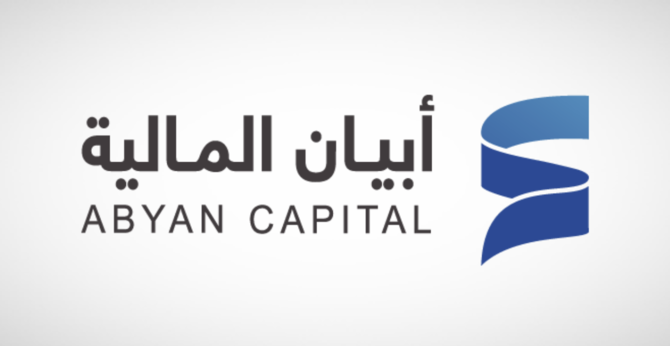
RIYADH: Financial robo-advisory firm Abyan Capital has secured $18 million in funding in further evidence of the growing confidence in the Kingdom’s artificial intelligence sector.
Led by STV, the funding round also saw participation from Aramco’s Wa’ed Ventures and RZM Investment.
Robo-advisors are digital platforms that utilize AI and machine learning algorithms to automate and optimize investment processes.
Founded in 2022 by Abdullah Al-Jeraiwi, Omar Al-Mania and Saleh Al-Aqeel, Abyan Capital is a financial services company that provides an automated solution and portfolio management for long-term investments.
“Abyan Capital stands out by unlocking the SR300 billion ($80 billion) investment management and wealth advisory sector for investors from all backgrounds in Saudi Arabia, through its mobile-first, robo-advisory model,” Yazeed Al-Turki, principal at STV, said in a statement.
In a short period of time, he said Abyan has enabled a large base of first-time investors to access multiple wealth management solutions, underscoring the team’s commitment to innovation and inclusivity.
“We are delighted to partner with Abdullah, Saleh and the team on their journey to redefine the wealth management ecosystem in the Kingdom,” Al-Turki added.
The company aims to utilize its newly secured funds to further enhance its platform, expand its suite of financial products, and accelerate its market penetration across the investment solution value chain.
“Today, we are proud that in a very short amount of time, Abyan has exceeded deposits of over SR1.4 billion and more than 100,000 portfolios invested. And we will be launching new diversified products soon with a goal to make Abyan the digital retail investment house,” said Al-Jeraiwi, the CEO.
Closing Bell: TASI ends the week in green at 12,352
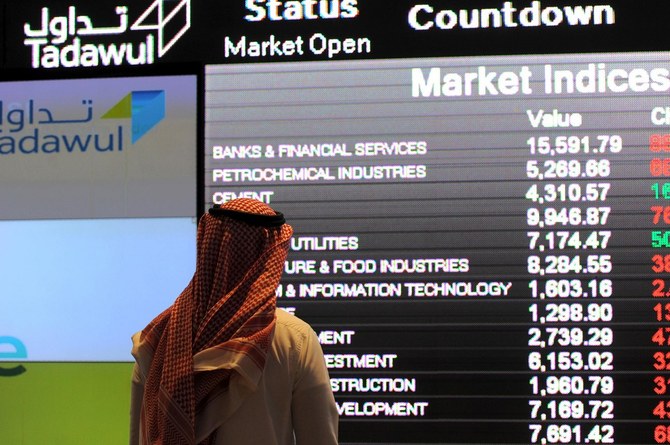
RIYADH: Saudi Arabia’s Tadawul All Share Index ended the week by gaining 6.68 points, or 0.05 percent, to close at 12,352.33 on Thursday.
The total trading turnover of the benchmark index was SR6.55 billion ($1.74 billion) as 120 stocks advanced, while 103 retreated.
The parallel market, Nomu, also gained 95.60 points, or 0.36 percent, to close the trading session at 26,457.81. This comes as 29 stocks advanced, while as many as 27 retreated.
On the other hand, the MSCI Tadawul Index slipped by 2.37 points, or 0.15 percent, to close at 1,547.20.
The best-performing stock on the benchmark index was Al-Baha Investment and Development Co., as its share price surged by 7.69 percent.
Other top performers included Raydan Food Co. and the Company for Cooperative Insurance, whose share prices soared by 7.29 percent and 6.63 percent, to stand at SR30.90 and SR160.80 respectively.
Electrical Industries Co. and the Mediterranean and Gulf Insurance and Reinsurance Co. also fared well during the last trading session of the week.
The worst performer was Saudi Chemical Co., whose share price dropped by 5.36 percent to SR7.77.
Power and Water Utility Co. for Jubail and Yanbu as well as the National Company for Glass Industries, underperformed as their share prices dropped by 5.22 percent and 4.82 percent to stand at SR63.50 and SR42.45, respectively.
On the announcements, Bank AlJazira announced its interim financial results for the period ending March 31 with net profit amounting to SR300.4 million compared to SR279.3 million in the previous quarter.
In an official statement on Tadawul, the bank attributed the increase in the net income to a decrease in total operating expenses by 6 percent.
“The decrease in total operating expenses is mainly due a decrease in net impairment charge for financing and other financial assets, other general and administrative expenses, salaries and employee-related expenses and other operating expenses against an increase in depreciation and amortization expenses,” the statement said.
Conversely, there has been a slight decrease of 0.2 percent in total operating income, primarily attributed to a reduction in net financing and investment gains. Additionally, the rise in net income was partially tempered by increased zakat charges over the period.
GCC central banks hold interest rates steady for 6th time following Fed’s move
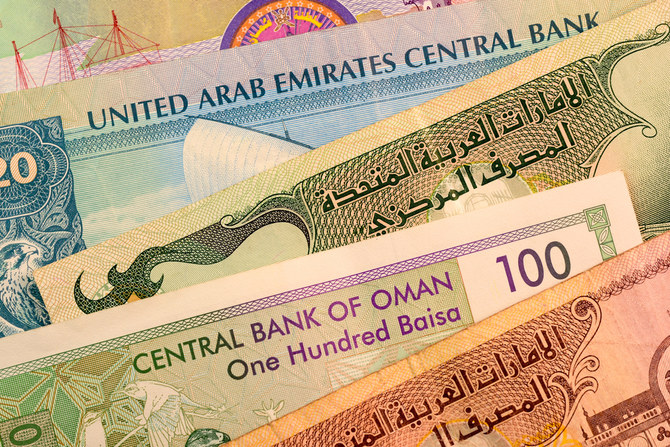
RIYADH: Gulf Cooperation Council central banks have held interest rates steady for the sixth time as the US Federal Reserve keeps its benchmark level between 5.25 percent and 5.50 percent.
As most currencies in the region are pegged to the US dollar, monetary policy follows the decisions taken in Washington, with policymakers opting to lock the rate at the level it has been since July.
The freeze comes as the rate-setting panel cites “a lack of further progress toward the committee’s 2 percent inflation objective.”
Vijay Valecha, chief investment officer at Century Financial, told Arab News: “This decision marks the sixth consecutive time that the central bank has chosen to keep rates unchanged. Market expectations have adjusted, now forecasting only one rate cut by year-end compared to the six anticipated at the beginning of 2024.”
He added: “The monetary policies of most central banks in the GCC countries, including the UAE, Saudi Arabia, Bahrain, Oman, and Qatar, typically mirror those of the Fed due to their currencies being pegged to the US dollar. Kuwait is the exception in the bloc, as its dinar is linked to a basket of currencies.”
Valecha continued by stating that as a result, interest rates in GCC markets are also anticipated to remain stable in the near future, which bodes well for the profitability of GCC banks.
This decision implies that the Saudi Central Bank, also known as SAMA, will maintain its repo rates at the current level of 6 percent.
The UAE central bank, along with Kuwait, Qatar, Oman, and Bahrain, also mirrored the Fed’s move.
Repo rates, which represent a form of short-term borrowing primarily involving government securities, underscore the close economic ties and financial dynamics between the GCC countries and the global economic landscape, particularly the US.
The US central bank also stated that it “does not expect it will be appropriate to reduce the target range until it has gained greater confidence that inflation is moving sustainably toward 2 percent.”
This indicates that rate cuts are not on the cards anytime soon, until inflation cools down and moves sustainably toward the 2 percent target set by the US Fed.


